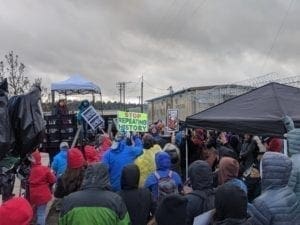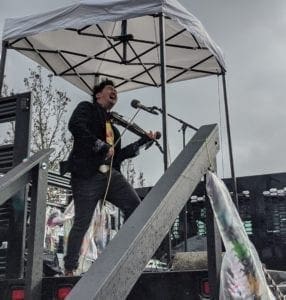Japanese American Elders Protest the Northwest Detention Center
Japanese American elders, their children and grandchildren, and many others held a protest at the Northwest Detention Center on Sunday, February 23rd. It was a partnership between Tsuru for Solidarity, Densho, Seattle Japanese American Citizens League and La Resistencia. This story looks at the generational impact incarceration has on families.
Tsuru for Solidarity is preparing for a pilgrimage on Washington DC from June 5 -7.
Full Story:
Many protesters gathered at Tacoma’s Northwest Detention Center, one of the largest ICE detention facilities in the nation. KBCS’ Sam Britt was there in heavy rain, and brings you this story.
I’m here at Tsuru for Solidarity’s Day of Remembrance and Action outside the Northwest Detention Center.
Despite the rain and the wind, before long, the streets outside of the Northwest detention center were flooded with people. huddled under umbrellas and tents surrounding the stage. Protesters activist and concerned citizens waited patiently for the events to formally begin. The crowd is filled with Japanese American elders that once faced incarceration by the United States, as well as the children and families of migrants that today face deportation or incarceration at facilities like the one here in Tacoma NW DC is one of the largest immigrant detention facilities in the country, owned and operated by the for profit corporation GEO Group. Inside, more than 1400 undocumented immigrants are housed, many of them for an undetermined period of time. The Japanese American group Tsuru for Solidarity organize the event today to protest the separation and incarceration of migrant families – something the Japanese community in the United States bears painful memories of.
James Arima: “I was born surrounded by barbed wire and guard cars in Crystal City, Texas. My father was separated from my mother and older siblings for almost three years. And I’m a product of the reunion. You know, and uh… I know that my father never recovered emotionally or economically from what was done to him. And my older siblings, people their age have memories of being incarcerated, but they claim they don’t. And I think it… it comes out in other ways from their suppressed memories. You don’t find them at events like this. I’m hopeful that someday they will because for many attending events like this it’s a healing.”
That’s James Arima, a survivor of the Japanese internment camps. He shared with me the lasting effects, discrimination and mass incarceration have had on him, his family and his generation growing up post World War Two. Dr. Satsuki. Ina is a Psychotherapist and founding member of Tsuru For Solidarity. She’s also a survivor of internment herself, and has devoted her life to studying the generational trauma her community still suffers with.
Can you describe to me your work and what you’ve discovered about group trauma,
Satsuki Ina: “Right. So, you know, collective historic trauma is something that has been inflicted on multiple groups of people of color in America. And particularly, my concern has been about children who are in this constant state of fear, separation, incarceration themselves, that when the nervous system and the brain is developing, to be in that state, actually alters physiologically, the brain functioning – so the child then grows up with a lot of anxiety and easily triggered defensive responses because of that. It’s influenced by culture too, so in my community, lots of anxiety and depression.”
And group trauma can touch more than just those who experienced the traumatic event. Its effects can be seen for generations to come. Mike, Ishii is a spoken word artist, and another founder of Tsuru For Solidarity, and the son of parents who went through the horrors of incarceration.
Mike Ishii: “What is confusing for us who were not incarcerated, but our descendants, is that we feel the trauma that was passed down through our parents to us. – and yet, it’s not happening, so you don’t understand why you have terrible anxiety, why you have panic attacks, why you lack confidence, why you feel so driven to have to do things perfectly, because after the war when they tried to come back into society, my family was targeted with violence. They shot our windows out, they spray painted death threats in front of the house. They would wait till my father left for work and they would call my mother and say, j*^ b#*@*, We’re going to come kill you now,”
And who was they?
Mike Ishi: “Our white neighbors and SeaTac”
…music…
There was pain here today. The now elderly children of incarcerated Japanese Americans remembered their loved ones lost, and the damage done to their families and communities. …And the still young children and wives of incarcerated migrants held by on the tall grey walls and barbed wire of the Northwest detention center remembered the faces of those they’d had taken from them.
There was also hope. Children folded paper cranes. Tsurus, in Japanese, a symbol for peace, compassion and hope. People played music beat drums, read poetry, chanted and remembered…Tsuru For solidarity is planning their largest action yet in Washington DC this June.
….music….
The violin you just heard was Kishi Bashi. I’m Sam Britt. Thanks to Yuko Kodama for help with editing.



